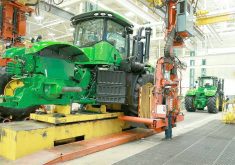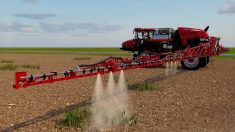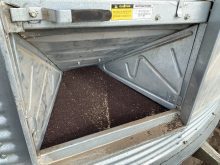The days of the CBC radio “Farm Broadcast” have passed into history, but many still fondly remember the noon-hour market reports and general agriculture news.
In Ontario, the host for 25 years was George Atkins, who passed away Nov. 30 at age 92.
In 1975, George was in Zambia to help with a workshop for Commonwealth farm broadcasters. While chatting with two broadcasters from Nigeria and Sierra Leone, he asked about their recent topics. He found they were delivering information such as on using pesticides, fertilizers and cleaning spark plugs on tractors. All worthy topics – if any of the farmers listening could afford such modern technology. George wondered if they wouldn’t be better off with practical information such as raising and using oxen or effective use of manure. His counterparts said they would, but had no source of such information. That was about to change.
Read Also

Farm equipment sales sector sees significant structural changes
Farming equipment sales have been declining for a number of years now, and one industry professional believes structural changes in the industry are needed to curb that trend.
On returning home, George set about forming the Developing Countries Farm Radio Network (DCFRN), an organization that could prepare radio scripts on topics of practical application for Third World farmers. On May 1, 1979, the first package went to 34 broadcasters in 26 countries.
Today, DCFRN, based in Ottawa under its new name of Farm Radio International (www.farmradio.org), distributes scripts to 320 broadcasters in Africa. While radio may now be old technology to us, no other can deliver information so quickly and cheaply, and be so effective to listeners who can neither read nor write.
To Canadian ears, the subjects of FRI scripts may sound “low tech,” but they embody the scientific principle of trying something different, seeing if it works, and passing it on. This year’s winner of the George Atkins Award, an FRI competition for scriptwriters, was Gladson Makowa, a broadcaster from Malawi, for his script “Manure – the magic worker,” which can be heard on FRI’s website. It describes how a second application of manure during the growing season is better than just one. Other scripts describe how cayenne pepper can discourage a formidable crop pest – elephants, or how lighting a candle in a grain storage container before sealing it can consume its oxygen and prevent insect infestation.
Underlying FRI is a key principle – to help small-holder farmers. It’s unfortunate to lose your farm in Canada, but in most cases there’s some kind of job and home to go to afterward. If you lose your farm in Africa, the odds are that you’ll end up working as near-slave labour in a factory, as a beggar on the street, or worse.
That principle of helping the small-holder farmer was recently endorsed by someone at the other end of the income scale, Bill Gates of Microsoft. Speaking last Oct. 15 at a World Food Day ceremony, Gates addressed the “false choice” of either using new technology to increase productivity, or not because of environmental concerns. He said there are points on both sides, but said this, repeating it a second time for emphasis:
“The next Green Revolution has to be greener than the first. It must be guided by small-holder farmers, adapted to local circumstances, and sustainable for the economy and the environment.”
That endorsement of George’s vision is more than just verbal – the Bill and Melinda Gates Foundation is funding a major FRI study on the most effective way to deliver farm radio. But in the meantime George’s organization still needs support for its ongoing work. His family has asked that any donations in George’s memory be made to FRI for its work in delivering scripts to help African farmers keep their families, their land and their communities healthy.
In his memory, we’ll end with the sign-off that George used for each of his broadcasts.
“Serving agriculture, the basic industry, this is George Atkins.”
John Morriss is a director of Farm Radio International














